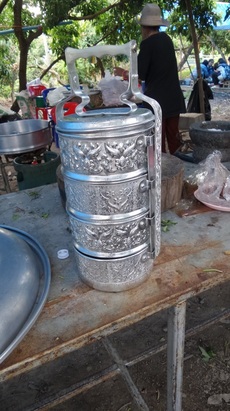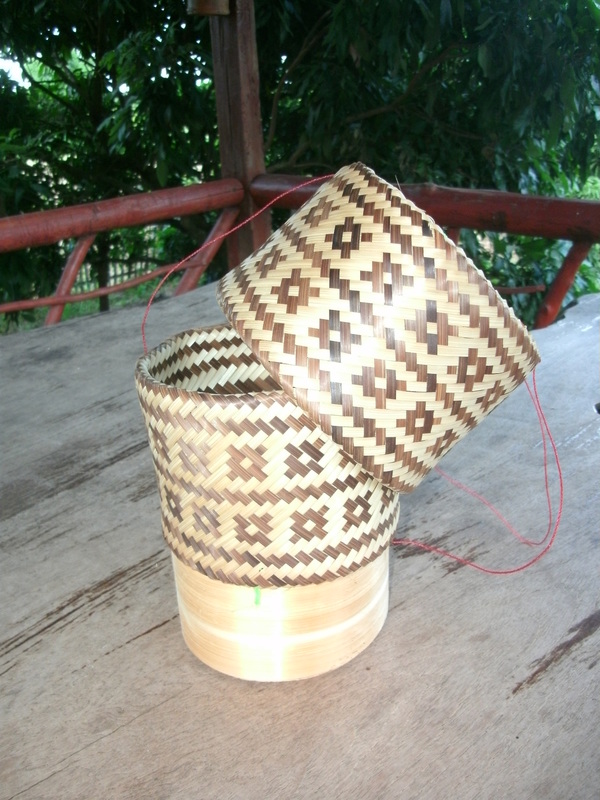|
Pinto (ปิ่นโต) food carrier pans were once found in every house. They are made of metal with metal straps so they can be stacked and carried. They were lunch buckets to convey prepared food. They are now artifacts. Most people know what they are and remember using them, and might even be able to lay hands on a set hanging in the rafters somewhere along with other utensils that are “still good”. But they are now hardly ever used, not even for taking food to the monks in the monastery, which was probably their last regular use.
Once we have focused on pinto pans, the question is what replaced them and what did they replace? If school students no longer carry pinto pans to school nor villagers use them to bring food to relatives, how does food get transported? The short answer is “plastic bags”. Since a large percentage of the population carries at least part of their meals home nearly ready to eat each day, millions of plastic bags are used and thrown away. Tons of plastic pellets are turned into bags by an industry dedicated to making pinto pans obsolete. School students buy their lunches; cash in the pocket has replaced pinto pans for them. One observation leads to another. Why were pinto pans abandoned? The reason is mostly the perception of convenience and cost. The pans had to be carried both ways, to and from, and kept track of in between, as well as cleaned. They were also a somewhat expensive investment; they were enameled metal, durable but costly. (The pinto set above is a ceremonial stack made of anodized aluminum to resemble embossed silver.) Plastic bags are thought of as free. Even the merchant-cook thinks of a bag as an inconsequential part of the operating cost, like gas for the stove. Costs to the environment that come from plastic production and disposal of once-used bags are at a distance. They are borne by others and factored into remote categories of accountability, or are ignored. We could also ask what pinto pans, and particularly their obsolescence, tell us about the lifestyle of Northern Thai villagers. That would lead us into questions about changes of diet, food preparation as a vanishing social, the dominance of a money economy and its impact on human dignity, and on and on. We have not considered what came before pinto pans. Before people had money what did they use instead of pinto pans? Remembering that the purpose of the pans is to carry food when it is to be consumed away from home, village elders will tell you that they used to carry their lunches in little baskets woven just for that purpose from split bamboo. (See the example above.) That opens another area to consider. Who knew how to weave those baskets? Were there various designs? And ultimately, why and to what extent did pinto pans replace them? In fact, rice baskets are still used to carry and temporarily store cooked sticky rice, but the baskets evoke thoughts of yesteryear. They symbolize the past even though they are still useful. Indeed, their use is expanded. They are as apt to store coins or packets of medicine or cosmetics around the house as rice. They have even been refined into handbags for women. They are marketed to tourists without reference to any particular use. One of the signs of an eclipsing aspect of culture is when its equipment is re-defined. In the earlier era, before money and commerce, necessary items were made locally or home made. That was the case with houses made of bamboo. When money became available metal products became common. This represented a step toward specialization in which people could concentrate on work at which they were most productive of profit, and not every family had to be self-reliant for everything. That era is passing quickly as a new generation arrives which prefers to avoid activities that deprive them of personal time. Technology facilitates leisure time, and then fills it.
0 Comments
Leave a Reply. |
AuthorRev. Dr. Kenneth Dobson posts his weekly reflections on this blog. Archives
March 2024
Categories |
| Ken Dobson's Queer Ruminations from Thailand |
|


 RSS Feed
RSS Feed
